THE CHURCH AND THE NEW VOTERS.
MEMBERS of the House of Commons who were at the great debates on the Corn Laws remember an incident not related in Mr. Morley's "Life of Richard Cobden." Mr. Cobden was arguing the cause of Free-trade in one of his speeches in the House, when he was interrupted by an in- cursion of the men who were then called Young England, or White Waistcoats, and who had come back after dinner " flown with insolence and wine." Mr. Cobden stopped in his argument, and, turning to these men standing at the bar, appealed to them in some such words as these :—' Now, why do you not attend to these questions ? Your fathers led our fathers to the battle-fields of Crecy and of Agincourt, and why ? Because they were the bravest, the wisest, and the best men of their time. And we are ready to follow you now, if only you will show yourselves fit to be our leaders.' Then he turned again to the Speaker, and went on with his argument. We think, sadly enough, how a like appeal might now be made to the Bishops and Clergy of the Church of England by those "capable citizens," the new voters. The Wycliffes and the Latimers were not merely teachers of a spiritual faith, or kind advisers of patience under the poor man's hard lot ; they knew and felt that they were Englishmen as well as Christians, leaders of Englishmen as well as ministers of religion, and that it was a real and important part of their calling to assert the rights as well as to declare and teach the duties of their people as English citizens. But how is it now ? The great and enthusiastic meetings of last autumn showed how eagerly the work- ing-men throughout the country desired to be admitted within the pale of the Constitution, there to exercise for the first time their full rights and duties as citizens. And every day now brings new proof that that en- thusiasm was no passing excitement, but a deep earnest temper, which is preparing, with all the energy of a new life, for the General Election in November. There is much ignorance and mach apathy still, especially among the agri- cultural labourers ; but these mists are fast dispersing, while we may say that the miners, the artisans, and the small country shopkeepers are already rejoicing in the full light of their new enfranchisement and citizenship. He must be a cold politician who, while taking part in the active preparations of his candidature, is not touched and warmed to the heart by the interest which these men are everywhere showing in the coming election. In meeting after meeting you may hear one or other of the older men tell of the days when the loaf cast a shilling, and wages were eight shillings a week, and God alone knows how they, with their wives and children, lived at all in those days ; and they tell the tale with an assurance that those days are now gone by for ever, because they will henceforth have an effective voice about the laws which made such things possible. And the rise of this new power in the State, and the consequent shifting of the centre of political life and action, are not less marked by the fierceness of the struggles by which the classes who have hitherto alone possessed the vote are trying to arrest the change. The dust and din of the fray are great to those who are in the midst of it ; yet we believe we might apply, without exaggeration, to the preparations everywhere making for the General Election, the language with which Milton pictured " a noble and puissant nation rousing herself like a strong man after sleep, and shaking her invincible locks." But where are our Bishops and Clergy in this crisis of our national life ? It cannot be said that they are laying hold on the occasion, as they might and should do. For the domestic, as for the spiritual, welfare of their flocks, they are now, as always, ready to expend any labour and make any sacrifices ; but in this, their peoplers new life of citizenship, they, with a few exceptions, show little or no interest. The way in which the Clergy are dealing with applications for the use of the parish school rooms for holding political meetings is significant in this respect. In country parishes, the school-room is usually the best and often the only room for holding such meetings. The name of "National," which used to. be its common appella- tion, may have become old-fashioned and obsolete ; but it is essentially national in its character and purpose, and one might have thought that an educated man, aware of the intimate relations of education and citizenship, would have seen a special fitness, as well as a practical convenience for the people of his parish, in the free use of the school-room for the political dis- cussions bv which, hearing both sides, the new citizens may be trained to understand their new rights and duties. But— not to speak of the partisans who have opened their school. rooms to one party and refused it to the other—there is, we fear and believe, a very general decision come to by the rural Clergy to refuse the use of the school-rooms to both parties, who are thus driven to the public-houses, from which one would think the clergyman would especially wish to keep his people away at times of great excitement and crowding. And even when the permission to use the school-room is given, it is given without any sympathy with the political aspirations of the poor men who 'gather there. Nor have the Bishops shown any higher appreciation of the case than their Clergy. In this same matter of the school-rooms, one or two of them have given the cold advice that if the school-room is lent at all it should be lent to both parties, but only as though the question were merely one of that peace by compromise which is so dear to the Episcopal mind. We do not forget the warmth with which the Archbishop, speaking for his brethren, welcomed the Franchise Bill in the House of Lords. But that momentary gleam of sympathy has not been followed by any lasting interest in the new citizens as such.
It would hardly be possible to overrate the importance of the influence which the Clergy might exert at the present moment, if, like " the bravest, and wisest, and best " of whom Mr. Cobden spoke, they would put themselves forward as the leaders of the people. Instead of this, they are, for the most part, either keeping aloof from politics as a worldly matter which does not concern those who should live at peace with all men, or much more frequently they are joining the Tory squires and farmers, and the small land- owners, solicitors, and doctors, who, 'Om the villa-people in the suburbs of the great cities, are the smallest-minded of all men- They are joining these men in the straggle to maintain the rights and interests of the privileged classes against those of the working-men. It is not too much to say that the destinies of the Church of England are at this moment in the hands of the Clergy. Mr. Albert Grey, speaking at Killingworth on the 27th of last month, with words full of wisdom and foresight, though we have not seen them much noticed, threw a new and real light on this subject. He said : —" He was ready, if Mr. Strachan wished, to devote the greater part of the next three months to the prosecution of a contest with him, before the electors of Tyneside as their jury, as to whether the interests of the poor, the morality of the people, and the prosperity of the country demanded that the State should or should not concern itself with the moral and spiritual as with the mental education of the people. He was convinced that the new Liberalism of the future would require, not the destruction, but the maintenance and reform, of the National Church, and he was prepared to stake his chances of election on his ability to convince the majority of the electors before the polling - day that the interests of true Radicalism would be better served by Church Reform than Disestablish- ment. The reforms he wished to be introduced into the Church were popular and democratic. He therefore looked not to the Clergy, nor to the Conservatives, but to the people, for support. It was said that Disestablishment was an old part of the Radical creed, but the Radical creed was entirely altered. The same men who opposed State interference when they had no share in the power of the State, were hot and eager for all kinds of State interference now that State power had fallen into their hands. So when the people had no con- trol over the Church, they cried, 'Disestablish it! ' but now that they could make what changes they pleased in the organi- sation of the Church, would they disestablish it ? Why should they disestablish their own Church If the Church was in its outward semblance the Church of the patron and the parson, whose fault was it ? The fault of those who had the power— their fault. The people hated the State when they were excluded from the direction of its affairs—now they loved it. They had to do for the Church what they had done for the State. In the local administration of the Church the people were kept out. Admit them ; give them a share in the management of their Church affairs, and they would find that the Church would derive its greatest support from that very quarter from which it is now most strongly threatened."
That the decision of the• new voters, and especially of the new county voters, will eventually solve the momentous problem of the true relations of the Church and State, we cannot doubt. This will not be in the coming Parliament, for all Liberals deserving the name, and with the powers and respon- sibilities of statesmen, are agreed that the question is not one for that Parliament to decide. But it will be by and through the discussions in and out of that Parliament, by the new voters and their representatives, that the question will be brought into the shape in which it will be finally dealt with. And therefore Mr. Grey does not over-rate the importance of the position of the new electors towards the Church. They need, and they are willing to accept, teachers and leaders ; the deepest cry of their spirits is for teaching and guidance. And in the country villages, wherever the parish clergy are holding aloof, or, still more, opposing their new aspirations, they are rallying to the Nonconformist ministers, to whom every Liberal candidate, Churchman or not, is looking for his most active and most intelligent support. Is it yet too late ? The future historian of our times will relate that at the moment at which the Church of England seemed to be called to its supreme defence against the demands for Disestablish- ment and Disendowment, a great opportunity for making that defence effectual arose unexpectedly, in the addition to the county constituencies of numbers large enough to turn the scale in its favour. Will he add that the rulers, and ministers, and friends of the Church did, or did not, avail themselves of the opportunity



































 Previous page
Previous page